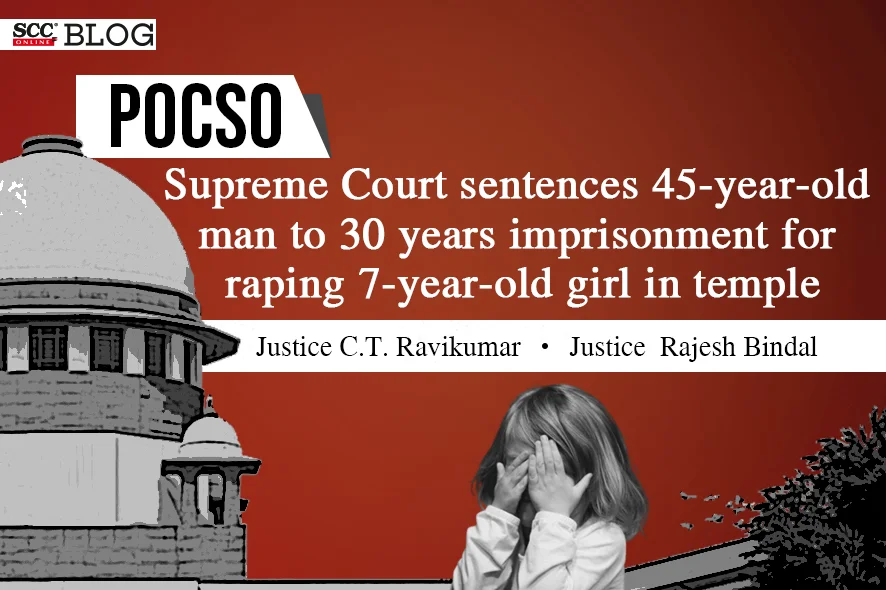Supreme Court: In a special leave petition against the Madhya Pradesh High Court’s decision, whereby, the capital punishment awarded to the convict was commuted to imprisonment for life for offences under Section 376-AB of the Penal Code, 1860 (‘IPC’) and the Protection of Children from Sexual Offences Act, 2012 (‘POCSO Act’), the Division Bench of C.T. Ravikumar and Rajesh Bindal, JJ. modified the convict’s sentence to thirty years of imprisonment and imposed a fine of Rs. 1 Lakh.
Factual Matrix
The minor victim’s grandmother filed a First Information Report (‘FIR’) on 21-05-2018 against the convict, alleging that he kidnapped and raped her seven years old granddaughter. The convict took the minor victim to the Rajaram Baba Thakur Mandir and committed rape upon her. The Trial Court found the convict guilty of offence under Section 376-AB of the IPC and awarded capital punishment. The convict was also found guilty of offences under Section 376 (2) (i) and Section 3 read with Section 4, and Sections 5(d) read with Section 6 of the POCSO Act, however, no separate sentences were awarded for the said offences by the Trial Court considering the conviction under Section 376-AB of the IPC.
As per the impugned judgment of the High Court, the capital punishment was not confirmed, and it was commuted to imprisonment for life.
Decision
The Court said that when the words ‘barbaric’ and ‘brutal’ are used simultaneously they should not be taken as synonym, but to take distinctive meanings. Regarding the manner in which the offence was committed, the Court noted that the High Court considered it to be ‘not barbaric and brutal’. However, the said that the convict’s action was barbaric though he had not acted in a brutal manner. The Court also said that the convict was aged 40 years on the date of occurrence and the victim was then only a girl, aged 7 years, whom he used to satisfy his lust. The Court also added that the convict took the minor victim to a temple, unmindful of the holiness of the place disrobed her and himself and then committed the crime. Therefore, the Court stated that “there is no hesitation to hold that the fact he had not done it brutally will not make its commission non-barbaric.”
Whether the commutation of capital punishment to sentence of life imprisonment required further interference?
The Court perused Section 376-AB of the IPC which provides for punishment for rape on woman under twelve years of age——Whoever, commits rape on a woman under twelve years of age shall be punished with rigorous imprisonment for a term which shall not be less than twenty years, but which may extend to imprisonment for life, which shall mean imprisonment for the remainder of that person’s natural life, and with fine or with death: Provided that such fine shall be just and reasonable to meet the medical expenses and rehabilitation of the victim: Provided further that any fine imposed under this section shall be paid to the victim.
The Court said that imprisonment for life under Section 376-AB of the IPC means imprisonment for the remainder of the convict’s natural life and the minimum term of imprisonment under the Section is twenty years. The Court relied on Shiva Kumar v. State of Karnataka, (2023) 9 SCC 817, wherein, Union of India v. V. Sriharan, (2016) 7 SCC 1, was referred to, whereby, it was held that “the power to impose modified punishment providing for any specific term of incarceration or till the end of the convict’s life as an alternate to death penalty, can be exercised only by the High Court and the Supreme Court and not by any other inferior Court.” It was also held in V. Sriharan (supra) that “where death penalty or life imprisonment is the punishment imposed by the trial court and confirmed by the Division Bench of the High Court, the convict concerned will get an opportunity to get such verdict tested by filing further appeal by way of special leave to this Court.”
Therefore, the Court said that once the conviction is sustained under Section 376-AB of the IPC the fixed term punishment could not be for a period of less than 20 years. The Court said that the High Court had rightly considered the aggravating and mitigating circumstances while commuting the capital sentence into life imprisonment which under Section 376-AB of the IPC means rest of the convict’s natural life. On the question of reformation and rehabilitation of the convict, the Court noted that the High Court opined that it is not a case in which the alternative punishment would not be sufficient in the facts of the case, but if the victim is religious, every visit to any temple may hark back to her the unfortunate, barbaric action to which she was subjected to. The incident may haunt her and adversely impact in her future married life.
Therefore, considering the present age of the convict and the fact that he had already undergone the incarceration, the Court held that a fixed term of sentence of thirty years, which shall include the period already undergone, must be the modified sentence of imprisonment. The Court also held that the convict is liable to suffer a sentence of fine which shall be just and reasonable to meet the medical expenses and rehabilitation of the victim, hence, a fine of Rs. One Lakh was imposed on the convict. The Court also said that the imprisonment awarded for the conviction under Section 363 of the IPC shall run concurrently and the amount of fine imposed thereunder shall be added to the fine imposed by the Court. The Court also held that no separate sentence for offences under the POCSO Act were to be imposed.
The Court directed that the convict shall not be released from jail before completion of actual sentence of thirty years.
[Bhaggi v. State of M.P., 2024 SCC OnLine SC 101, Order Dated: 05-02-2024]









